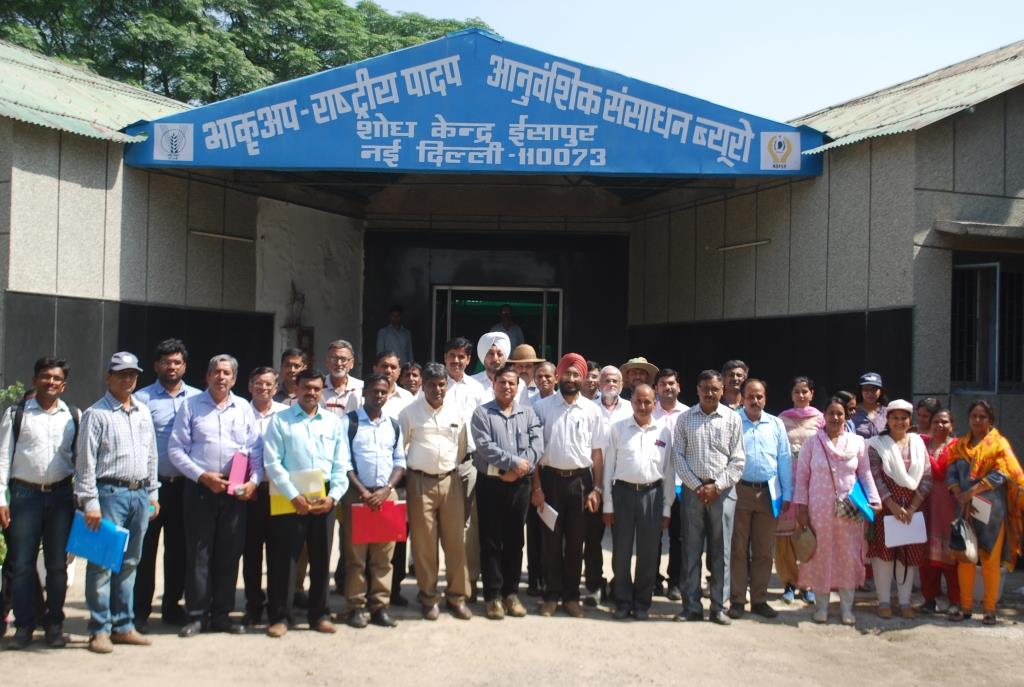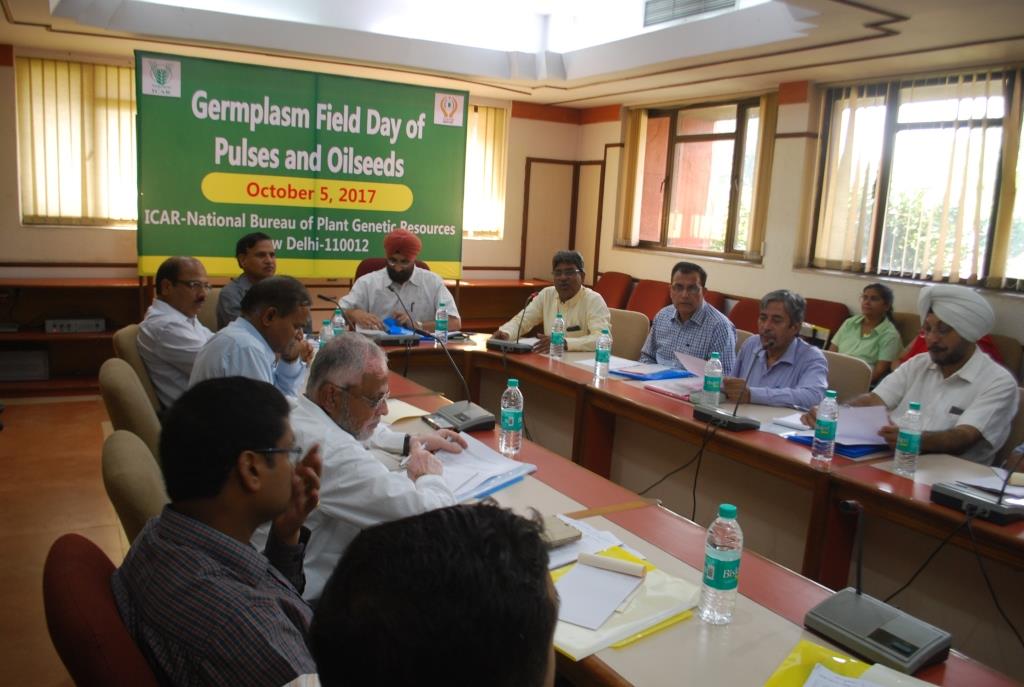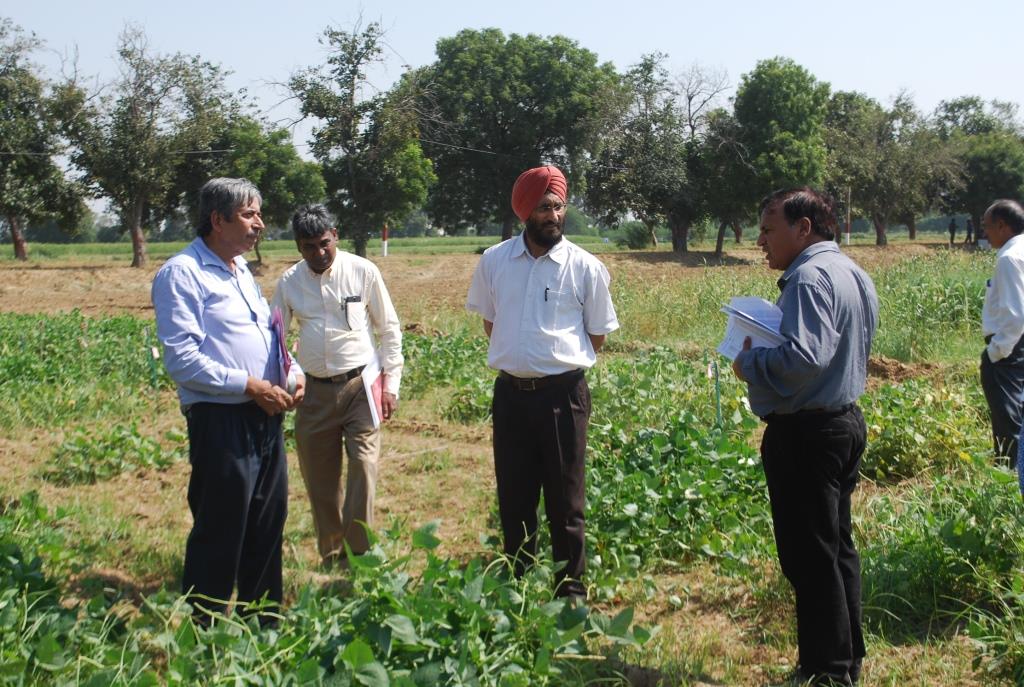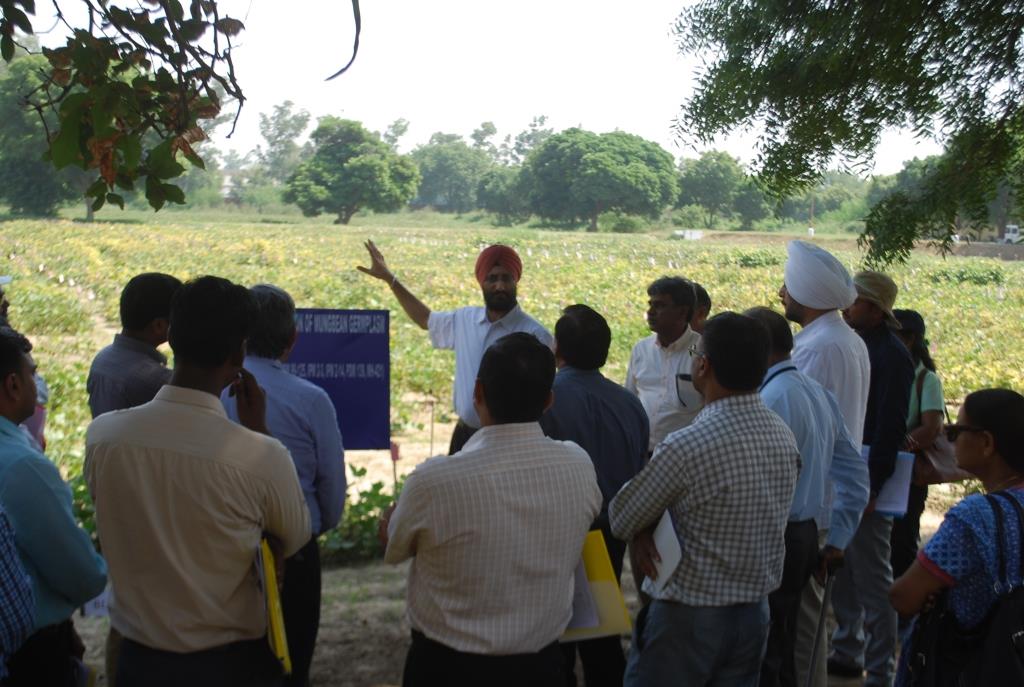Germplasm Field Day on Pulses and Oilseeds organized at ICAR-NBPGR on 5 October, 2017
Date Posted: 10-10-2017
|
|
Germplasm Field Day on Kharif Pulses (Vigna)   and Oilseeds (Sesamum) was organized on October 5, 2017 at ICAR-National Bureau of Plant Genetic Resources (NBPGR), New Delhi. The event was attended by over fifty participants from different organizations viz., Bioversity International; Asian Vegetable Research & Development Centre (AVRDC); State agricultural universities namely Shere-Kashmir University of Agricultural Sciences & Technology (SKUAS&T), Jammu; Punjab Agricultural University (PAU), Ludhiana; Rajasthan Agricultural Research Institute (RAU), Durgapura; Navasari Agricultural University, Navasari; Sardarkrushinagar Dantewada Agricultural University, SK Nagar; Anand Agricultural University, Vadodara; University of and Oilseeds (Sesamum) was organized on October 5, 2017 at ICAR-National Bureau of Plant Genetic Resources (NBPGR), New Delhi. The event was attended by over fifty participants from different organizations viz., Bioversity International; Asian Vegetable Research & Development Centre (AVRDC); State agricultural universities namely Shere-Kashmir University of Agricultural Sciences & Technology (SKUAS&T), Jammu; Punjab Agricultural University (PAU), Ludhiana; Rajasthan Agricultural Research Institute (RAU), Durgapura; Navasari Agricultural University, Navasari; Sardarkrushinagar Dantewada Agricultural University, SK Nagar; Anand Agricultural University, Vadodara; University of   Agricultural Sciences, Raichur; University of Agricultural Sciences, Dharwad; Professor Jaishanker Telangana State Agricultural University (formerly ANGRAU), Telangana; TNAU, National Pulses Research Centre, Vamban; Chandra Shekhar University of Agricultural Sciences & Technology (CSAUAT), Kanpur; and ICAR institutes viz., ICAR-IIPR, Kanpur; ICAR-IARI, New Delhi; ICAR-NBPGR, New Delhi. Dr. Ashok Kumar, Principal Scientist, Division of Germplasm Evaluation, ICAR-NBPGR welcomed the participants and informed about the germplasm being grown at ICAR-NBPGR. Dr. N.P. Singh Director, ICAR-IIPR and Chief Guest suggested that NBPGR-IIPR joint field days should be organized. He also emphasized the need of collaborative evaluation for getting germplasm for new ecologies. Dr. Kuldeep Singh, Director, ICAR-NBPGR stressed to identify basic issues in crops of Vigna group and strategies should be developed to solve them through collective and collaborative approach. The participants visited the ICAR-NBPGR Experimental Farm, Issapur where 1400 accessions of mungbean, 800 accessions of urdbean, 371 accessions of cowpea and 696 accessions of sesame were grown for characterization and evaluation. The participants examined the material critically and selected germplasm of their choice according to their breeding objectives. Participants also visited ICAR-NBPGR Farm, IARI, New Delhi, where 700 accessions of mungbean and 770 accessions of urdbean have been screened against mungbean yellow mosaic virus (MYMV) under natural conditions. During interaction, the participants appreciated the efforts of ICAR-NBPGR in showcasing the material at appropriate stage. The detailed discussion was held on issues like collection of trait specific germplasm, screening against biotic and abiotic stresses namely cold, salinity etc., and the need of pre-breeding and genetic enhancement in these indigenous crops. Dr. N.K. Gautam, Senior Scientist and Member, Organizing Committee proposed the vote of thanks. Agricultural Sciences, Raichur; University of Agricultural Sciences, Dharwad; Professor Jaishanker Telangana State Agricultural University (formerly ANGRAU), Telangana; TNAU, National Pulses Research Centre, Vamban; Chandra Shekhar University of Agricultural Sciences & Technology (CSAUAT), Kanpur; and ICAR institutes viz., ICAR-IIPR, Kanpur; ICAR-IARI, New Delhi; ICAR-NBPGR, New Delhi. Dr. Ashok Kumar, Principal Scientist, Division of Germplasm Evaluation, ICAR-NBPGR welcomed the participants and informed about the germplasm being grown at ICAR-NBPGR. Dr. N.P. Singh Director, ICAR-IIPR and Chief Guest suggested that NBPGR-IIPR joint field days should be organized. He also emphasized the need of collaborative evaluation for getting germplasm for new ecologies. Dr. Kuldeep Singh, Director, ICAR-NBPGR stressed to identify basic issues in crops of Vigna group and strategies should be developed to solve them through collective and collaborative approach. The participants visited the ICAR-NBPGR Experimental Farm, Issapur where 1400 accessions of mungbean, 800 accessions of urdbean, 371 accessions of cowpea and 696 accessions of sesame were grown for characterization and evaluation. The participants examined the material critically and selected germplasm of their choice according to their breeding objectives. Participants also visited ICAR-NBPGR Farm, IARI, New Delhi, where 700 accessions of mungbean and 770 accessions of urdbean have been screened against mungbean yellow mosaic virus (MYMV) under natural conditions. During interaction, the participants appreciated the efforts of ICAR-NBPGR in showcasing the material at appropriate stage. The detailed discussion was held on issues like collection of trait specific germplasm, screening against biotic and abiotic stresses namely cold, salinity etc., and the need of pre-breeding and genetic enhancement in these indigenous crops. Dr. N.K. Gautam, Senior Scientist and Member, Organizing Committee proposed the vote of thanks.
|
|
|
|
|
|
|
|
|